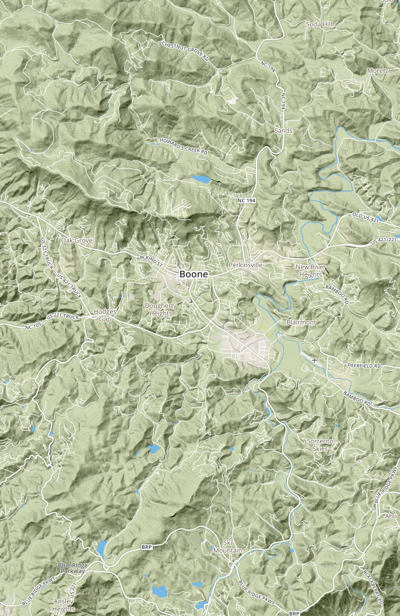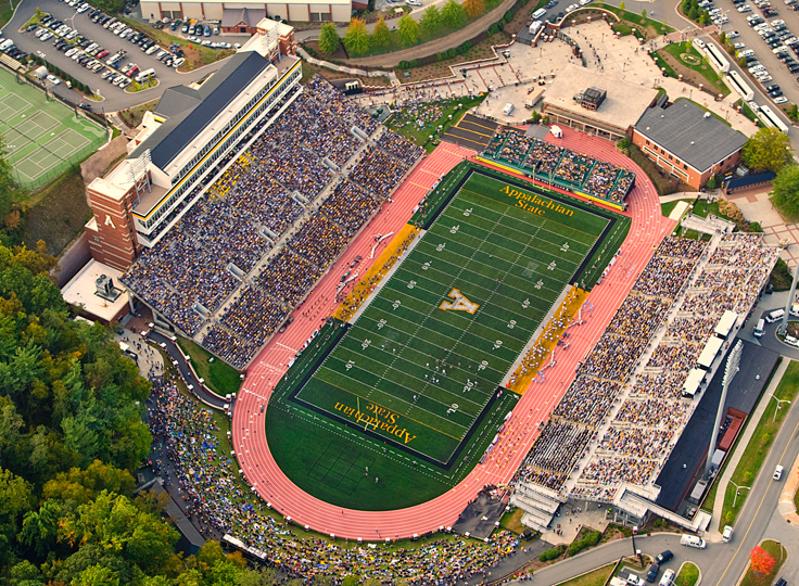My diary
To begin my travelogue I wanted to start by focusing on one of my first revelations in the reading. I was struck by the complications of the Academic structure and specifically Appalachian State (my workplace) raised by our course readings. I felt it important to interact with this and reflect on it throughout happenings in my work for the week. Here I am choosing to do the "non-specified outing" model outlined in our syllabus. My goal here is to critique my current environment through a postcolonial lens.
The readings have specifically discussed commodification of the university by the neoliberal world as well as the way in which the university can reproduce hegemonic power. I also wanted to see if I could explore the community vs academic dynamic at work here in the mountains.
The first issue which came to mind was related to the commodification of the academy. Specifically, Swarr and Nagar write "thus, if we take the connections between the politics of knowledge and the politics of location (identity) and of space seriously, we may need to take on broad institutional ethnography projects that allow a materialist understanding of academic spaces as mobilizing and reproducing hegemonic power (pg.47). Because of this I felt it really important to analyze these academic spaces a bit more.
There was a town hall earlier this week with the Chancellor and her cabinet about public/private partnerships at the university. Over the
jalorello
6 chapters
15 Apr 2020
Encountering the Academy
September 08, 2016
|
Boone, NC
To begin my travelogue I wanted to start by focusing on one of my first revelations in the reading. I was struck by the complications of the Academic structure and specifically Appalachian State (my workplace) raised by our course readings. I felt it important to interact with this and reflect on it throughout happenings in my work for the week. Here I am choosing to do the "non-specified outing" model outlined in our syllabus. My goal here is to critique my current environment through a postcolonial lens.
The readings have specifically discussed commodification of the university by the neoliberal world as well as the way in which the university can reproduce hegemonic power. I also wanted to see if I could explore the community vs academic dynamic at work here in the mountains.
The first issue which came to mind was related to the commodification of the academy. Specifically, Swarr and Nagar write "thus, if we take the connections between the politics of knowledge and the politics of location (identity) and of space seriously, we may need to take on broad institutional ethnography projects that allow a materialist understanding of academic spaces as mobilizing and reproducing hegemonic power (pg.47). Because of this I felt it really important to analyze these academic spaces a bit more.
There was a town hall earlier this week with the Chancellor and her cabinet about public/private partnerships at the university. Over the

summer it came to the attention of the university community that the chancellor may be exploring private options at the university to fund buildings, staffing and even take over our current locally run dining services. Immediately (amidst the chancellor firing a beloved Vice Chancellor and ultimately cleaning house) a large group of the community was asking for answers, and the response to have a town hall. At the town hall it was reiterated that no one would be losing jobs in the community and they were not looking to privatize departments on campus. Instead they are wanting private companies to help build buildings by entering into public/private partnerships with them. In essence the private company puts all the money up to pay for the building and the university doesn't actually own anything. They use the space, and staff the space but basically rent it. Several skeptical students and faculty spoke up about the dangers of this idea and the way it has worked out poorly for many other schools including in the UNC System. What was most interesting to me was the way in which the Cabinet attempted to sell folks on the idea. By privatizing they argue that building new buildings would allow for the expansion of the academic programs (new academic space etc.) and would also allow for more sustainable technology (core mission of the university). Of course some of this may be true, but one of the areas they are looking to privatize is the area around the football stadium (not much was shared at the town hall about this but it is one of the first items on the list). They want to expand the football stadium, put in more academic space and even a residence hall that athletes could live in.
The narrative being told is one that would have you believe the university simply wants to further its academic mission but ultimately there may be some other, neoliberal, and hegemonic structures behind the proposal.
An intersection here occurs with a postcolonial critique of the university operations. Appalachian is a predominately white school with a large population of the football team being black. For me this causes a real conflict as I feel this further others and creates a spectacle of the black football players (and unfortunately black folks at the university in general since the assumption is made they must be an athlete if they are there) and reinforces hegemonic power and allows football players to become consumable by the white students, alumni and staff, not to mention used for their neoliberal capitalistic purpose.
Another connection to the reading takes place here when Mohanty writes that "Capitalist or corporate models of citizenship craft loyalty to the nation in the image of capitalist market relations, folding the ideas of democracy and freedom into the logic of the market" (pg. 158). We have already talked a bit about the academy being commodified by the market mentality. This same "loyalty to the nation" is crafted at the local level of university by brand and often football/athletic programs. So not only does football at the university reproduce hegemonic systems of power, but it also furthers the neoliberal mission of the university by fitting into capitalist market relations. After all a big part of athletic programs existence are the ability they have to create revenue for the university.

In regards to Race in Boone we also fail to recognize the systemic levels of racism that exist in the local community. Originally a small mountain town in the western north carolina, there has been one very small black community that has existed for several years. Often Boone is though of as a liberal/hippie area in my mind, but the reality is there is still no where for a black person to get their hair done in town. Basic cultural services fail to exist in the area, yet we are recruiting people of color to come to the mountains. The Local concerns of a history of whiteness and colonialism also need to be addressed.
But how does one counter the power of the neoliberal movement at the university? It seems overwhelming at times. What collaborations could exist to problematize hegemonic processes and transform them? How do we do grassroots work to provide resources in our community? As Mohanty writes " the struggles against domination and for social justice have to be waged situationally and regionally as well as globally and the very basic ethical and moral notions of citizenship, belonging and democracy are at stake here neoliberal" (pg. 186).
The power needs to be made visible. Perhaps using the academic space as a strength here by incorporating this into classwork, workshops and other areas. Yet we need to move forward carefully at the risk of further reinforcing the same hegemonic processes as was evidenced in the research on problematic syllabi in our reading. To me the issue of the neoliberal university exists in a global context but has very specific local realities that I have mentioned just a couple of above.
I also wonder the community vs academy dynamic that could be at play here in this local context. They both highly influence on another in the support of the neoliberal university. Sports gives the community capitalistic life by bringing in tourists and their money. I doubt many would be willing to listen to a critique of an up and coming football program. The university is also a huge employer in the town but I wonder what sort of insider vs outsider dynamic exists especially with a liberal university in a conservative and rural area. As Swarr and Nagar write "in North America, the binary that distinguishes the “academy” from the “community” or the academic from the activist, that has also made it necessary to pen the qualification “activist scholar,” has assisted in the creation of apparently distinct spaces where the former is privileged over the latter. This process of binary/boundary making is also a fundamental way to (re)configure space and to mask the power relations that constitute that reconfiguration" (pg. 32). I know that this binary/boundary exists here. But how can we work with the local community to unmask the power relations. I think it is possible and some work has begun to pop up with recent issues and protests around black lives matter and HB2 in our community.
I just wonder if the battle against the neoliberal commodification is even a battle possible to fight at this point? Are there other smaller fish to fry? One person and class/group at a time highlighting and open the doors to hegemonic power structures in other areas of campus (because there are plenty). Whole doc programs such as are can exist to discuss these topics but 15,000 students still exist in their programs which salute the hegemonic power structures of the neoliberal university and their powerhouse football team....Still much to ruminate here throughout the semester....
Talpade Mohanty, C. (2003). Feminism without borders: Decolonizing theory, practicing solidarity. Durham, NC: Duke University Press. (FWB)
Lock Swarr, A. and Nagar, R. (Eds.). (2010). Critical transnational feminist praxis. NY: SUNY Press. (CTFP)
Share your travel adventures like this!
Create your own travel blog in one step
Share with friends and family to follow your journey
Easy set up, no technical knowledge needed and unlimited storage!